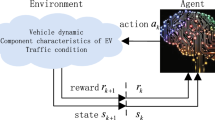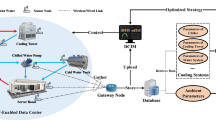Abstract
Intelligent load scheduling for the smart city is essential due to the growth of industrialization, which directly consumes energy from the grid. The energy management system in industrialization is enhanced using the Internet of things in the same domain. The general need in a smart city is to maintain the energy utilization and cost that the industrial Internet of things could achieve for industry application. Researchers have also found a solution to this problem, but every time the generator cannot sell energy, the industry purchases the same. There is a chance for the industry to supply its energy to other industries or the grid. By kee** this constraint, an intelligent approach to load scheduling based on optimized Q-Net is proposed in this paper, comprising the supplies as renewable energy, battery, and industrial energy. Also, the reactive power flow of smart cities during scheduling is mitigated by classifying the energy available in the bus network. The proposed method scheduled demand power with 99% accuracy with the lowest cost of 13.7041$/KW for peak hr. scheduling with a demand of 6000KW/hr.

















Similar content being viewed by others
Data availability
Data sharing is not applicable to this article.
References
Calvillo CF, Sánchez-Miralles A, Villar J (2016) Energy management and planning in smart cities. Renew Sustain Energy Rev 55:273–287
Carli R, Dotoli M, Pellegrino R (2016) A hierarchical decision-making strategy for the energy management of smart cities. IEEE Trans Autom Sci Eng 14(2):505–523
Xu L, He W, Li S (2014) Internet of things in industries: a survey. IEEE Trans Ind Inf 10(4):2233–2243
Liu Y, Yu R, Pan M, Zhang Y, **e S (2016) SD-MAC: spectrum database-driven MAC protocol for cognitive machine-to-machine networks. IEEE Trans Veh Technol 66(2):1456–1467
Wei M, Hong SH, Alam M (2016) An IoT-based energy-management platform for industrial facilities. Appl Energy 164:607–619
Liu Y, Yang C, Jiang L, **e S, Zhang Y (2019) Intelligent edge computing for IoT-based energy management in smart cities. IEEE Netw 33(2):111–117
Muna AH, Moustafa N, Sitnikova E (2018) Identification of malicious activities in industrial Internet of things based on deep learning models. J Inf Secur Appl 41:1–1
**aoyi Z, Dongling W, Yuming Z, Manokaran KB, Antony AB (2021) IoT driven framework based efficient green energy management in smart cities using multi-objective distributed dispatching algorithm. Environ Impact Assess Rev 88:106567
Wang N, Li B, Duan Y, Jia S (2021) A multi-energy scheduling strategy for orderly charging and discharging of electric vehicles based on multi-objective particle swarm optimization. Sustain Energy Technol Assess 44:101037
Han T, Muhammad K, Hussain T, Lloret J, Baik SW (2020) An efficient deep learning framework for intelligent energy management in IoT networks. IEEE Internet Things J 8(5):3170–3179
Abdel-Basset M, Hawash H, Chakrabortty RK, Ryan M (2021) Energy-net: a deep learning approach for smart energy management in iot-based smart cities. IEEE Internet Things J 8(15):12422–12435
Zhu C, Leung VC, Wang K, Yang LT, Zhang Y (2017) Multi-method data delivery for green sensor-cloud. IEEE Commun Mag 55(5):176–182
Tang C, Wei X, Zhu C, Chen W, Rodrigues JJ (2018) Towards smart parking based on fog computing. IEEE Access 6:70172–70185
Chang Q, Ma X, Chen M, Gao X, Dehghani M (2021) A deep learning based secured energy management framework within a smart island. Sustain Cities Soc 70:102938
**ao Q, Li C, Tang Y, Chen X (2020) Energy efficiency modeling for configuration-dependent machining via machine learning: a comparative study. IEEE Trans Autom Sci Eng 18(2):717–730
Ahmed MS, Mohamed A, Shareef H, Homod RZ, Abd Ali J (2016) Artificial neural network based controller for home energy management considering demand response events. In: 2016 international conference on advances in electrical, electronic and systems engineering (ICAEES) IEEE, pp 506–509.
Hussain I, Ullah I, Ali W, Muhammad G, Ali Z (2022) Exploiting lion optimization algorithm for sustainable energy management system in industrial applications. Sustain Energy Technol Assess 52:102237
Sardar A, Khan SU, Hassan MA, Qureshi IM (2023) A demand side management scheme for optimal power scheduling of industrial loads. Energy Syst 14(2):335–356
Zhu D, Yang B, Liu Y, Wang Z, Ma K, Guan X (2022) Energy management based on multi-agent deep reinforcement learning for a multi-energy industrial park. Appl Energy 311:118636
Xu Z, Han G, Liu L, Martínez-García M, Wang Z (2021) Multi-energy scheduling of an industrial integrated energy system by reinforcement learning-based differential evolution. IEEE Trans Green Commun Netw 5(3):1077–1090
Lu R, Hong SH, Yu M (2019) Demand response for home energy management using reinforcement learning and artificial neural network. IEEE Trans Smart Grid 10(6):6629–6639
Mocanu E, Mocanu DC, Nguyen PH, Liotta A, Webber ME, Gibescu M, Slootweg JG (2018) Online building energy optimization using deep reinforcement learning. IEEE Trans Smart Grid 10(4):3698–3708
Claessens BJ, Vrancx P, Ruelens F (2016) Convolutional neural networks for automatic state-time feature extraction in reinforcement learning applied to residential load control. IEEE Trans Smart Grid 9(4):3259–3269
Mahapatra C, Moharana AK, Leung VC (2017) Energy management in smart cities based on Internet of things: peak demand reduction and energy savings. Sensors 17(12):2812
Liu Z, Jiang P, Wang J, Zhang L (2021) Ensemble forecasting system for short-term wind speed forecasting based on optimal sub-model selection and multi-objective version of mayfly optimization algorithm. Expert Syst Appl 177:114974
Ma L, Liu N, Zhang J, Wang L (2018) Real-time rolling horizon energy management for the energy-hub-coordinated prosumer community from a cooperative perspective. IEEE Trans Power Syst 34(2):1227–1242
Dimitroulis P, Alamaniotis M (2022) A fuzzy logic energy management system of on-grid electrical system for residential prosumers. Electric Power Syst Res 202:107621
Funding
No funding is provided for the preparation of the manuscript.
Author information
Authors and Affiliations
Contributions
All authors read and approved the final manuscript.
Corresponding author
Ethics declarations
Conflict of interest
Authors declare that they have no conflict of interest.
Ethical approval
This article does not contain any studies with human participants or animals performed by authors.
Consent to participate
All the authors involved have agreed to participate in this submitted article.
Consent for publication
All the authors involved in this manuscript give full consent for publication of this submitted article.
Additional information
Publisher's Note
Springer Nature remains neutral with regard to jurisdictional claims in published maps and institutional affiliations.
Rights and permissions
Springer Nature or its licensor (e.g. a society or other partner) holds exclusive rights to this article under a publishing agreement with the author(s) or other rightsholder(s); author self-archiving of the accepted manuscript version of this article is solely governed by the terms of such publishing agreement and applicable law.
About this article
Cite this article
Gayathri, N., Krishnakumar, C. Regional deep energy Q-Net-based energy scheduling for industrial energy management system. Electr Eng 106, 941–954 (2024). https://doi.org/10.1007/s00202-023-02037-5
Received:
Accepted:
Published:
Issue Date:
DOI: https://doi.org/10.1007/s00202-023-02037-5




